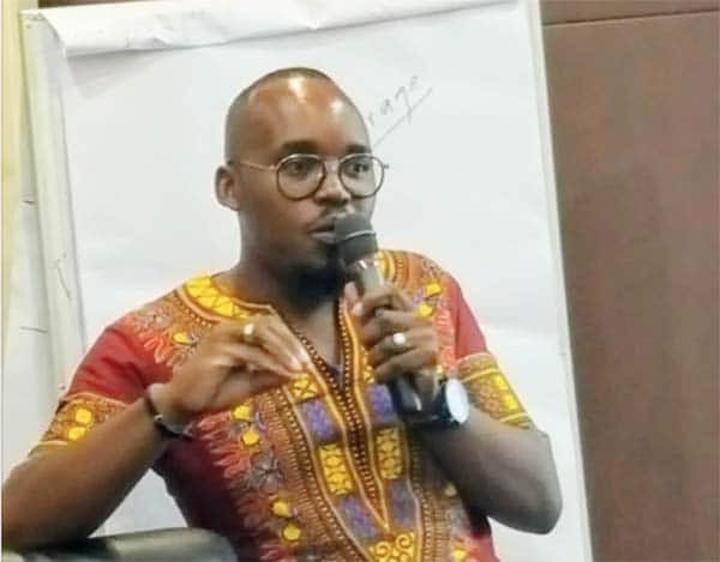Africa-Press – Lesotho. On Saturday, November 1 last year, Maseru residents woke up to news of the chilling murder of a Ha Tsolo woman whose body was found dumped at Sethaleng-sa-mopapa next to Maseru Mall.
The deceased young woman had the night before boarded what she assumed was a 4 plus 1 taxi at the mall after withdrawing her wages. There were three men in an unmarked Honda Fit when she got in. Unbeknown to the former garment factory worker, this was to be her last car ride.
Police found her badly mutilated body the next morning after her husband’s frantic efforts to find her on the fateful night had come to naught, despite her distress text messages to him when she sensed danger.
And on January 19, this year another woman’s naked body was found dumped on the outskirts of Ha Seleso. This time police made a quick breakthrough in the case.
They arrested Moleboheng Tšoeu’s husband Tolo Joseph Tolo of Mazenod for her murder. Tolo, 35, allegedly orchestrated the murder of his wife in order to claim compensation on his insurance policy.
He has since been arraigned before the Maseru Magistrate’s Court. Police spokesperson Superintendent Mpiti Mopeli told reporters the body of the 26-year-old woman who worked at the Ha Tsolo Industrial Area had several open wounds.
It is alleged her husband paid a hitman M15,000 to kill her so he could get a M40 000 payout from a local insurer. Ts’oeu’s life was worth M25 000 to Tolo whom she married in December last year.
According to official figures, the slain women are among mounting grim statistics of women who die at the hands of men, including family and intimate partners every year. Rights groups report a sharp spike in murders of girls and women in their own homes globally, including in Lesotho.
In neighbouring South Africa where Intimate Partner Violence (IPV) is rife, Sandile Mantsoe last year shocked hardened South Africans when he brutally murdered his girlfriend Karabo Mokoena and torched her body.
Mantsoe is languishing in jail after being convicted of murder and assault with intent to do grievous bodily harm. Mantsoe, a married father of three, had reportedly been in a romantic relationship with Mokoena since October 2016.
It is believed that he and his wife were estranged. In a statement read out by Captain Rogers Mahundla in the South Gauteng High Court in Johannesburg before sentencing last year, Mantsoe claimed Mokoena had attempted to commit suicide several times.
He claimed Mokoena had multiple sexual partners, including one who “used to give her R100 000 a month”, which made her “addicted” to a glitzy lifestyle.
In the statement, Mantsoe also claimed Mokoena used to beat him up and that she had become angry and depressed after being raped by one of her former lover’s friend.
And in a more dramatic case that captured international headlines, former Paralympian Oscar Pistorius shot dead his girlfriend Reeva Steenkamp in the early hours of Valentine’s Day in 2013.
Pistorius fired four times through the locked door of his bedroom toilet, later saying that he had thought his model girlfriend was an intruder. The court didn’t believe him and sent him to prison.
These cases bear out a new study from the United Nations Office of Drugs and Crime, which shows the most dangerous place for a woman is not a dark street in a strange city.
The study found that intimate partners or family members are responsible for the majority of female killings around the world. In 2017, about 87,000 women worldwide were murdered, the bulk of them, 58 percent, at the hands of someone known to them.
Thirty percent of those murders were carried out by current or former lovers. The report found that often these murders are not random but are rather, an off-shoot of past gender-related violence against the victim.
When an intimate partner murders a woman, the report states that jealousy and fear of abandonment are among the reasons. However, it adds that women “are also killed by fathers, brothers, mothers, sisters and other family members because of their role and status as women.
” In 2017, Asia had the largest overall number, at 20,000, of women killed by intimate partners or family members. Africa followed with 19,000. Then came the Americas with 8,000 murders; Europe had 3,000 and Oceania with 300.
However, based on population, Africa and the Americas are the parts of the world where women are most at risk of this crime, known as femicide. The study found the rate in Africa is 3.1 per 100,000 female population.
In Lesotho, the proportion of women and men experiencing gender-based violence follows international trends as 86 percent of reported cases show women as victims.
At least 47 percent of women murdered in Lesotho die at the hands of their intimate partners, while only six percent of homicide cases involving men include their partners, says Federation of Women Lawyers (FIDA) project officer Advocate Lerato Seema.
This, experts say, is attributable to marital pressures and power relations which are skewed in men’s favour. Official estimates show that Lesotho ranks third highest in Africa in prevalence of intimate partner violence, with more than 86 percent of women having experienced gender-based violence.
Early marriage is also a common practice as Lesotho’s 2016 census shows that nearly a quarter of women aged 20 to 24 were married before the age of 18.
Marriage counsellor Calvin Motebang says failure in relationships, demands for equal rights by women, economic fluctuations, unemployment, and political instability are among factors that frustrate people resulting in impatience and violence.
“People fail to be flexible and adapt with changing conditions and standards of living hence take out their frustration on others,” Motebang says.
United States Ambassador to Lesotho Rebecca Gonzalez underscores this point, saying inequalities between the genders contribute to abuse of girls and women.
Recounting a trip to a DREAMS – Determined, Resilient, Empowered, AIDS Free, Mentored, and Safe Women – function, Gonzalez who herself had to overcome adversity to punch her way to the top, issued a stinging rebuke at men who use their positions of authority to have their way with women.
“I was deeply moved by what they told us – including harrowing stories of how a young Mosotho girl who seeks sponsorship for schooling or a creative endeavour is told she would first have to offer sexual favours.
I was saddened – and angered – to hear how some young women are chided or ostracised when they go to a clinic seeking contraceptives or access to medication, by the very health workers who are duty-bound to assist them.
“While I was disheartened by what they told us, I was incredibly proud and honoured to witness as these DREAMS Ambassadors so confidently and courageously made their voices heard.
“I share these details with you now and extend the invitation to all Basotho, whether policy makers, community leaders, or engaged citizens, to respond to the calls from these young women. Responsiveness begins with simply listening, but it must go further to include action.
The DREAMS partnership is built upon a multi-layered approach, which goes beyond the health sector, addressing other structural risk factors, like poverty, gender inequality, sexual violence, and lack of education.
“To make an impact, we need to ensure that girls stay in school all month long and those that need education assistance can access it. There needs to be teachers who are dedicated and well-trained for the important work they do,” she wrote in an article to commemorate Women’s Day.
In cases of gender-based or sexual violence, there must be a safe place of refuge where an individual can receive appropriate care, she said, adding together “we can do more to create a better future for adolescent girls and young women across sub-Saharan Africa”.
Columnist and rights activist Rethabile Mahopolo in one of her seminal articles bemoaned the spike in femicide. “It’s saddening that this beautiful well-cultured country is listed as one with the highest prevalence of rape and violence against women.
It’s bad enough that as wealthy as our Kingdom is, we are listed as one of the poorest countries in the world! I have seen so many posts on social media from some of our South African neighbours ridiculing and mocking us.
“We have been called thieves, robbers, prostitutes, paupers and lots of other demeaning names.
But the fact is we are Basotho, beautiful people with a rich culture, who have sadly been besieged by a leprotic plague that has damaged our moral fibre and numbed our conscience,” Mahoplo writes.
She counsels Basotho to band together and work towards the “healing that this country so badly needs”. “We need to stop being passive about the violation of women and children.
Let’s take a stand Basotho and rebuild our broken country and bring healing to our hurting women and children and make our Kingdom safe again. Quoting Martin Luther King Jr, Mahopolo notes: “In the end we will not remember the words and actions of our enemies, but the silence of our own.”






